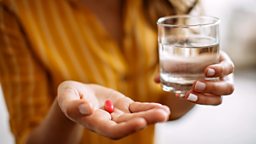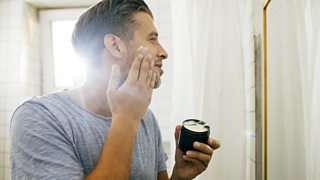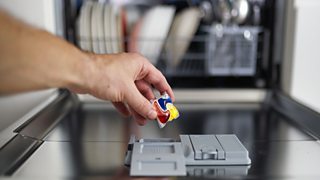Can anti-ageing supplements help us to stay young?
Among the many wonder products out there on the market, there is a type that inspires equal parts fascination and scepticism – anti-ageing products. Are there really longevity supplements and so-called 'forever drugs' that can combat the seemingly inevitable march of time?
In this special 100th episode of 大象传媒 Radio 4's Sliced Bread, presenter Greg Foot is facing the facts about anti-ageing products. Listener Soly wants to know whether longevity supplements like resveratrol and NMN can wind back our biological clocks to keep us healthier and more energised. Greg is joined by physicist and computational biologist Andrew Steele to sift through the wealth of medical research on anti-ageing products.
Here's what you need to know about anything that claims to slow or reverse the ageing process…

Many deadly diseases can be thought of as symptoms of ageing
Many of the biggest killers worldwide – such as heart disease, cancer, or strokes – can be thought of as really being symptoms of the ageing process. As Andrew puts it: “If you get cancer, that’s a symptom of all these other changes that have gone on in your body in the years prior to your cancer diagnosis.”
Looking at the statistics helps to illustrate Andrew’s logic. The safest people on Earth are 10-year-olds in the developed world, with a less than a 1 in 10,000 chance of dying in any given year. This chance doubles every eight years, up until you’re in your 90s when your chances have risen to 1 in 6.
Andrew identifies 10 hallmarks of ageing that collectively contribute to common life-threatening conditions, such as DNA degradation, the accumulation of senescent (or old) cells and permanent inflammation of our immune system. It’s these factors that determine your ‘biological age’ rather than simply how many candles you have on your birthday cake. This is why some 60-year-olds start to slow down, while others still participate in strenuous activities like mountain climbing.
Most marketed longevity supplements have little to no scientific backing
Many supplements will claim to reverse or limit these 10 hallmarks of ageing, with varying degrees of reliability.
A commonly touted compound called NMN claims to stem your cells’ ageing process. After oral consumption, NMN is converted into a different compound called NAD that supports metabolic function, DNA repair, and helps to prevent cellular senescence. The theory goes that your NAD levels decrease as you age, so taking NMN will give you more NAD and make you biologically younger. But the issue is your body already tightly regulates its NAD levels, and there’s no good evidence that NMN actually works to increase your lifespan.
Resveratrol – alongside its close cousin pterostilbene - is a compound with similarly shaky evidence behind it. It’s found among other places in red wine, and it was previously proposed as an explanation for the ‘French Paradox’: why French people have low rates of heart disease. Resveratrol seemed to activate a gene that extends lifespan in yeast, so it was thought to have similar effects in humans. But this claim was undermined when researchers realised that resveratrol may not actually have been activating this gene, but instead reacting with a fluorescent dye and giving a false result. And there’s since been evidence that ‘French Paradox’ is an illusion caused by the ways different countries collect statistics.
But one longevity supplement with better scientific evidence is spermidine, a compound that may activate autophagy in cells – a self-deletion process that helps recycle old cells. There’s evidence this works in mice: in one study, for example, it extended mice lifespan by 10% and improved their cardiovascular health. Observational studies of humans with high spermidine diets back up this finding – but Andrew reminds us that “we really need to do a proper randomised trial” to be “much more certain that the results are down to just the spermidine and not other things that might differ between the groups”.
The claims of some anti-ageing gurus might not all stack up
Some people have taken the anti-ageing fight to its extreme, employing multiple doctors and implementing taking courses of drugs and supplements to keep them young. One such person is Bryan Johnson, an entrepreneur who claims his anti-ageing Blueprint products can give you more energy and help you live longer. Bryan himself takes both NMN and spermidine, and offers spermidine as one of “74 health actives” in the ‘Blueprint Stack’ - which comes in the form of four types of pills, a drink mix, a protein meal and a bottle of olive oil

Blueprint’s health 'interventions' are supposedly based on evidence from more than a thousand clinical trials. But Andrew points out that none of these ingredients – in fact, no drug or supplement ever - has been shown in a clinical trial to improve longevity in humans. And while Bryan claims to have made his own body into an experiment, it’s crucial to remember that “even if he’s doing it absolutely perfectly, it might only apply to his biology”. With some tiers of Blueprint costing up to £380 per month, Andrew believes that money is might be better spent on exercise equipment, a gym membership or a healthier diet.
Antioxidants and free radicals aren't as important as people claim
Bryan Johnson’s Blueprint claims to offer “multifaceted benefits” including, among other things, “antioxidant support”. This reference to antioxidants is likely connected to an outdated theory called the ‘Mitochondrial Free Radical Theory of Ageing’. Mitochondria are often referred to as the ‘powerhouses’ of the cell. They take ‘food’ and ‘burn’ it with oxygen to create energy. But sometimes, this process spits out free radicals which, when accumulated, can cause damage to other cellular structures. It was previously thought this damage was accumulating over time and causing ageing, so by consuming lots of antioxidants – compounds that mop up these free radicals and prevent the damage – you could combat ageing.
This theory started to fall apart in the 2000s, and a massive review of clinical trials including almost 300,000 people found that too many antioxidants like β-carotene and vitamin E were associated with increased the risk of death. It seems likely that free radicals aren’t the threat they’re made out to be, with the body having in some cases even evolved to put them to good use. For example, immune cells called neutrophils weaponise free radicals to kill harmful bacteria. This isn’t to say you should avoid antioxidants, but rather that you should avoid supplementing them into your diet unless specifically advised by your healthcare professional – you should still consume them as part of a balanced diet, and take them as supplements if your doctor says so – but there’s no evidence that you should be taking them as supplements otherwise.
Some of the most promising anti-ageing products are drugs prescribed for other things
While it may sound like there are no viable anti-ageing products out there, there are a few compounds that are more promising. In some cases they are drugs already being prescribed today, just for different conditions and uses.
While it may sound like there are no viable anti-ageing products out there, there are a few compounds that are more promising.
One such drug is rapamycin, a compound discovered in bacteria from Rapa Nui (Easter Island) that inhibits the growth of many cell types. This can come in handy, like when rapamycin is used as an immune suppressant, an anti-cancer agent or as an anti-fungal coating on stents. In the early 2000s, scientists realised rapamycin might also have an anti-ageing effect – a finding that was later backed up by a wealth of studies on mice and marmosets. Bryan Johnson himself takes rapamycin twice a week.
Another line of potentially helpful compounds known as senolytic cells help fight ageing by killing senescent cells. A 2018 paper found that younger mice given senolytic drugs were able to run for longer and had younger-looking fur with plumper skin. There are many, many more compounds with these kinds of promising results – but they all need more funding to see if they’re safe and effective in humans.
Tackling ageing requires more awareness and more funding
Currently, there are no ongoing anti-ageing trials in humans. One trial called TAME (Targeting Ageing with Metformin) is trying to find funding, but because the drug was previously used to treat Type 2 diabetes and its patent has expired, there’s no financial incentive for pharmaceutical companies to pursue it further. That’s why Andrew thinks studies like these need to be funded publicly rather than privately. He thinks we sometimes “get very distracted by debating the very fragmented evidence about all these different supplements” when “we’ve got so many really, really promising drugs in the pipeline”.
These anti-ageing products could easily become the best thing since sliced bread, but for right now, most longevity supplements out there are just marketing BS. Andrew believes that the best things we can currently do to prevent ageing are the classics – good sleep, plenty of exercise, and a nutritious, vegetable-rich diet.
To hear more about the science of anti-ageing, listen to the full episode of Sliced Bread on 大象传媒 Sounds now.
The information contained in this article was correct at the time of broadcast on 10 October, 2024.
More articles from Sliced Bread
-
![]()
Are expensive face creams worth the money?
Greg Foot delves into the world of ointments and creams.
-
![]()
Are expensive dishwasher tablets worth the money?
Sliced Bread looks at the range of washing products out there.
-
![]()
Which pots and pans are best for your kitchen?
Greg Foot heads into the kitchen to investigate our cookware.
-
![]()
Are expensive sports bras worth the money?
Can one sports bra really suit all sports?





